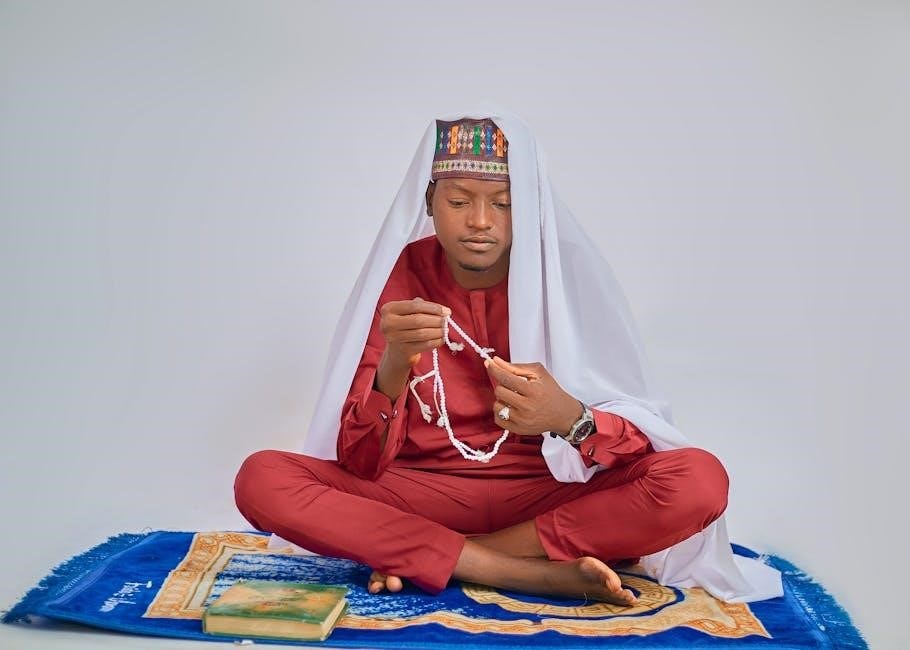Welcome to Being Muslim: A Practical Guide, a comprehensive resource designed to help individuals understand and live according to Islamic teachings․ This guide focuses on providing clear, actionable knowledge to navigate daily life as a Muslim, covering essential practices, spiritual growth, and community engagement․ Perfect for new Muslims or those seeking a deeper connection to their faith, it offers a straightforward approach to implementing Islamic values in everyday life․
Understanding the Basics of Islam
Islam is a faith rooted in submission to God (Allah) and living according to His guidance․ It is built on the belief in one God, His prophets, and the Day of Judgment․ The Quran and Sunnah (teachings of Prophet Muhammad) serve as the primary sources of guidance․ Key principles include the Five Pillars—Shahada (faith declaration), Salah (prayer), Zakat (charity), Siyam (fasting), and Hajj (pilgrimage)—which form the foundation of a Muslim’s practice․ Understanding these basics provides a clear framework for living a righteous and purposeful life, as emphasized in resources like Being Muslim: A Practical Guide․ This foundational knowledge helps believers navigate their spiritual and daily responsibilities with clarity and confidence․
The Importance of Practical Knowledge in Islam
Practical knowledge is vital in Islam, as it bridges the gap between theoretical understanding and real-world application․ The faith emphasizes applying teachings in daily life, ensuring that beliefs translate into actions․ Resources like Being Muslim: A Practical Guide highlight the necessity of actionable knowledge, enabling individuals to navigate modern challenges while adhering to Islamic principles․ This approach ensures that faith remains relevant and impactful, guiding decisions in worship, ethics, and community engagement․ By prioritizing practical knowledge, Muslims can embody their faith authentically, fostering personal growth and benefiting society; This focus on application makes Islam a comprehensive way of life, addressing spiritual, moral, and social dimensions effectively․
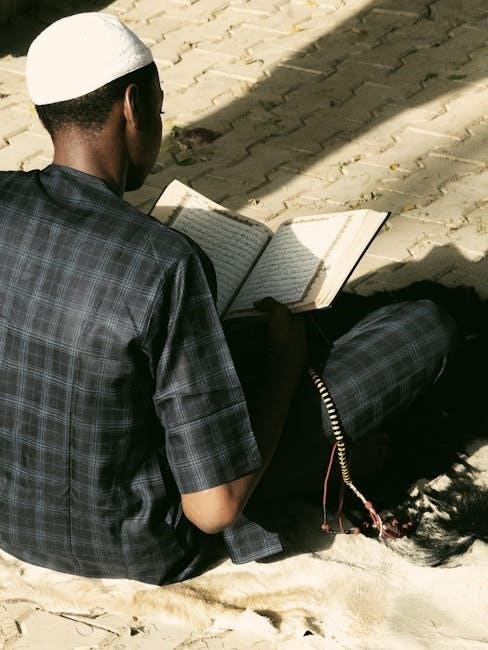
Foundational Beliefs of Islam
Islam is built on core beliefs that shape a Muslim’s understanding and relationship with Allah․ Central to this foundation are the Six Articles of Faith, which include belief in Allah, His angels, the holy books, the prophets, the Day of Judgment, and divine decree․ These principles provide a clear framework for faith, guiding Muslims in their spiritual journey and daily practices․ Understanding these beliefs is essential for living a purposeful and righteous life, as they form the basis of Islamic teachings and practices․
The Six Articles of Faith
The Six Articles of Faith are the fundamental beliefs that every Muslim must uphold․ They are the cornerstone of Islamic Creed (Aqidah), providing a clear and structured framework for faith․ The first article is the belief in the Oneness of Allah, affirming His existence as the sole creator and sustainer of the universe․ The second is faith in Allah’s angels, who act as His messengers and agents in the world․ The third article is belief in the divine books, such as the Quran and the Bible, which guide humanity․ The fourth is acceptance of all prophets, with Prophet Muhammad (peace be upon him) as the final messenger․ The fifth is belief in the Day of Judgment, where every soul will be held accountable for their deeds․ Finally, the sixth article is faith in divine decree, accepting that everything happens according to Allah’s will․ These beliefs are essential for a Muslim’s spiritual foundation and guide their understanding of the world and their purpose within it․
The Five Pillars of Islam
The Five Pillars of Islam are the essential acts of worship that form the foundation of a Muslim’s life․ The first pillar is the Shahada, the declaration of faith: “There is no god but Allah, and Muhammad is the Messenger of Allah․” The second pillar is Salat, performing the five daily prayers facing Mecca․ The third is Zakat, giving a portion of one’s wealth to those in need․ The fourth is Sawm, fasting during the month of Ramadan from dawn to sunset․ The fifth is Hajj, the pilgrimage to Mecca at least once in a lifetime for those able․ These pillars are universal obligations for all Muslims, fostering spiritual growth, community, and devotion to Allah․

Daily Worship and Rituals
Daily worship and rituals are central to a Muslim’s spiritual life, fostering a deep connection with Allah and promoting a disciplined, mindful lifestyle rooted in faith and devotion․
Performing the Five Daily Prayers
Performing the five daily prayers is a fundamental obligation in Islam, fostering spiritual growth and mindfulness․ These prayers, known as Salah, are performed at specific times: Fajr (dawn), Dhuhr (noon), Asr (afternoon), Maghrib (sunset), and Isha (night)․ Muslims face the Kaaba in Makkah, symbolizing unity․ Each prayer includes recitation of the Quran, bowing, and prostration, expressing humility and gratitude․ Ablution (Wudu) is essential before prayer to ensure purity․ Prayers strengthen the connection with Allah, providing guidance and peace․ Consistency in Salah is highly rewarded, reflecting a Muslim’s commitment to their faith and fostering self-discipline and devotion․
Observing Fasting in Ramadan
Observing fasting during Ramadan is one of the Five Pillars of Islam, a sacred obligation for Muslims․ Fasting, or Sawm, involves abstaining from food, drink, and worldly desires from dawn to sunset․ The month of Ramadan is a time for spiritual reflection, self-control, and increased devotion․ Muslims prepare with a pre-dawn meal called Suhoor and break their fast at sunset with Iftar․ Fasting fosters empathy for the needy and strengthens one’s relationship with Allah․ It is essential to focus on acts of worship, such as reciting the Quran and performing additional prayers․ Ramadan concludes with Eid al-Fitr, a celebration of gratitude for completing the fast․
Pay Zakat: The Obligation of Charity
Zakat, or alms-giving, is the third pillar of Islam, requiring Muslims to donate a portion of their wealth to those in need․ It is a means of purifying one’s wealth and soul, fostering a sense of community and social responsibility․ Zakat is typically 2․5% of excess savings and assets, given annually to eligible recipients, such as the poor, needy, and those in debt․ It promotes equality and reduces poverty, while also strengthening the giver’s faith and generosity․ Zakat is a compulsory act of worship, reflecting Islam’s emphasis on balancing spiritual and material life․ It is a fundamental practice that benefits both the individual and society, reinforcing justice and compassion․
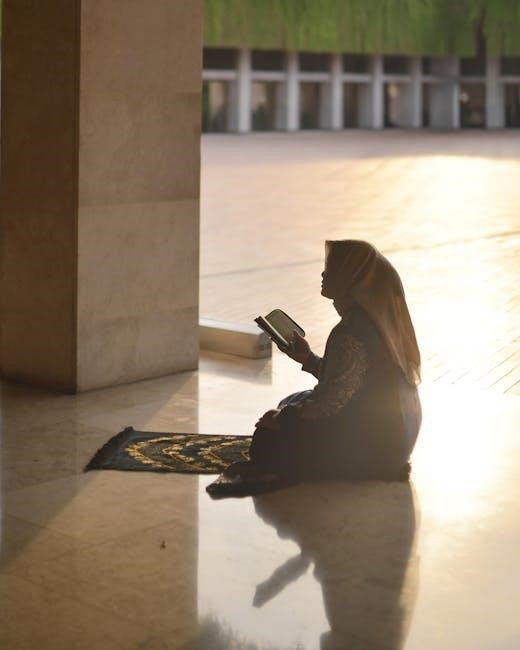
Spiritual Practices
Spiritual practices in Islam foster a deep connection with Allah, cultivating inner peace and guidance․ They shape a Muslim’s thoughts, actions, and overall way of life․
Reciting the Quran and Its Benefits
Reciting the Quran is a cornerstone of Muslim worship, offering spiritual enrichment and divine connection․ It serves as a source of guidance, comfort, and healing․ Regular recitation strengthens faith, enhances mental clarity, and fosters emotional solace․ The Quran’s words, revealed in Arabic, carry profound meaning and rhythm, making it a unique form of worship․ Muslims are encouraged to recite with proper tajweed (elocution) to honor the text․ The act fosters a deeper understanding of Islamic teachings and promotes self-reflection․ It also cultivates humility and gratitude, while its memorization (hifz) is highly rewarded․ Reciting the Quran is not just a ritual but a transformative practice that nurtures the soul and aligns one’s life with divine will․
Performing Dhikr and Dua
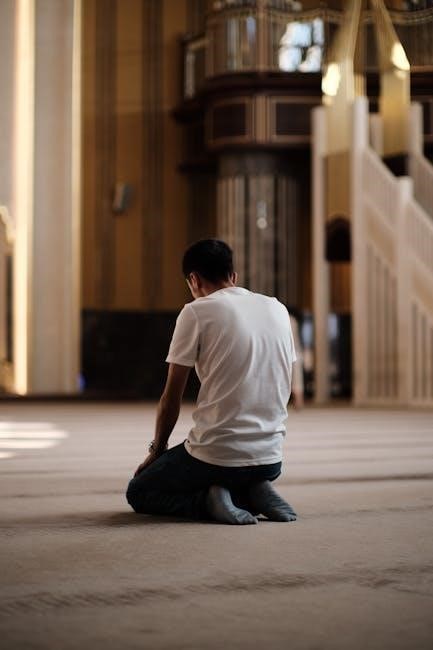
Performing Dhikr (remembrance of Allah) and Dua (supplication) are essential spiritual practices in Islam․ Dhikr involves reciting specific phrases, such as Subhanallah (Glory be to Allah) or Alhamdulillah (Praise be to Allah), to cultivate mindfulness and connection with the Divine․ Dua, on the other hand, is a heartfelt conversation with Allah, expressing gratitude, seeking guidance, or requesting forgiveness․ Both practices strengthen faith, bring peace, and foster a sense of humility․ They can be done at any time, especially after prayers or during quiet moments․ Regular Dhikr and Dua help believers stay grounded, relieve anxiety, and align their intentions with Allah’s will, fostering a deeper spiritual life․
Cultivating Gratitude and Sincerity

Cultivating gratitude and sincerity are vital for a meaningful Muslim life․ Gratitude, or shukr, involves recognizing and appreciating Allah’s blessings, no matter how small․ This fosters contentment and strengthens one’s relationship with Allah․ Sincerity, or ikhlas, means performing actions solely for Allah’s pleasure, free from worldly motives․ Practicing gratitude can be done through daily reflection, thanking Allah for health, family, and provisions․ Sincerity is cultivated by introspecting intentions before actions, ensuring they align with Islamic values․ Together, these qualities promote humility, inner peace, and a deeper connection to faith․ They are essential for living a balanced, Allah-centered life and earning His divine acceptance․
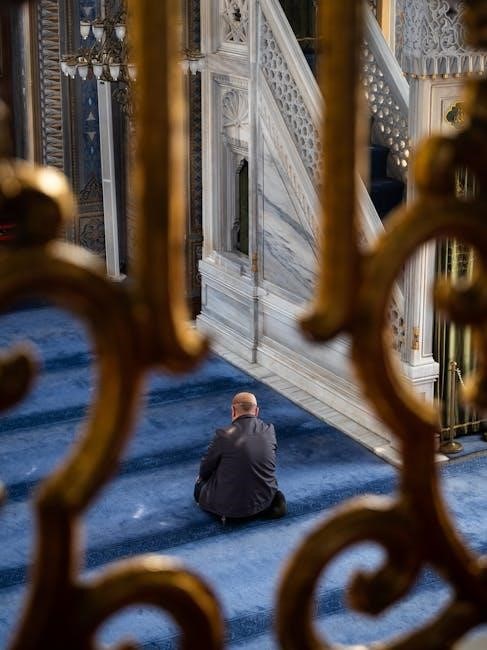
Moral and Ethical Living
Moral and ethical living in Islam emphasizes adhering to divine guidance in all aspects of life․ It promotes honesty, fairness, and compassion, fostering a just and harmonious society․
Adab: Islamic Etiquette and Manners
Adab, or Islamic etiquette, is a cornerstone of Muslim life, encompassing proper behavior, respect, and humility in all interactions․ It teaches believers to conduct themselves with grace and dignity, reflecting their faith․ From greeting others with “As-salamu alaykum” to showing respect to elders and teachers, Adab fosters a culture of kindness and compassion․ It also includes practices like eating with the right hand, being mindful of personal hygiene, and avoiding gossip or harmful speech․ Adab is not just about social norms but a reflection of one’s spiritual state, ensuring that daily actions align with divine teachings and promote harmony in society․
Living with Honesty and Integrity
Living with honesty and integrity is a fundamental aspect of Islam, reflecting the Prophet Muhammad’s teachings․ Muslims are encouraged to be truthful in words and actions, avoiding deceit and dishonesty․ Integrity involves standing by moral principles, even in challenging situations, and fulfilling promises and obligations․ This applies to personal relationships, business dealings, and community interactions․ Islam emphasizes the importance of trustworthiness, as honesty builds respect and strong bonds․ Being truthful also extends to self-reflection, ensuring intentions and actions align with righteous values․ By embracing honesty and integrity, Muslims cultivate a noble character, pleasing to Allah and beneficial for societal harmony;
Practicing Forgiveness and Mercy
Practicing forgiveness and mercy is a cornerstone of Islam, reflecting Allah’s attributes of compassion and clemency․ Muslims are encouraged to forgive others for their wrongdoings, as forgiveness leads to spiritual peace and strengthens relationships․ The Prophet Muhammad (peace be upon him) exemplified mercy in his dealings, even with adversaries․ Showing mercy involves treating others with kindness, especially in times of conflict or misunderstanding․ Forgiveness also extends to seeking pardon from Allah for one’s sins, a practice emphasized in daily prayers․ Cultivating a merciful heart fosters humility and promotes a harmonious society․ By embracing forgiveness, Muslims draw closer to Allah’s divine mercy and create a ripple effect of kindness in their communities․
Family and Social Life
Family and social life are vital in Islam, emphasizing harmony, mutual respect, and responsibility․ Muslims are taught to prioritize family bonds, uphold justice, and contribute positively to society while adhering to Islamic values․
Building a Strong Muslim Family
Building a strong Muslim family is rooted in fostering love, respect, and faith․ Parents should prioritize Islamic education, teaching children about Allah, the Quran, and Sunnah․ Creating a peaceful home environment through open communication and mutual respect is essential․ Leading by example in worship and character helps children emulate righteous behavior․ Establishing regular family prayers and Quran recitation strengthens spiritual bonds․ Encouraging honesty, kindness, and forgiveness among family members promotes a harmonious household․ Parents should also nurture their children’s physical, emotional, and mental well-being, ensuring they grow into capable and compassionate Muslims․ A united, faith-centered family is a source of comfort and strength in fulfilling Islamic duties and achieving Jannah․
Marriage in Islam: Rights and Responsibilities
Marriage in Islam is a sacred contract based on mutual respect, trust, and affection․ Men and women have equal rights to choose a spouse, with the husband responsible for providing financial support and the wife managing the household․ Both partners must fulfill their duties with justice and kindness․ The Quran emphasizes that spouses are garments for each other, symbolizing comfort and protection․ Each must support the other’s spiritual growth and uphold moral values․ Disputes should be resolved through dialogue and consultation․ Islam teaches that a successful marriage combines love, compassion, and shared responsibility, fostering a harmonious family life․ Seeking guidance from scholars is encouraged to navigate challenges wisely․

Raising Muslim Children with Values
Raising Muslim children with strong moral and spiritual values is essential for their development and the preservation of faith․ Parents should lead by example, demonstrating love, patience, and adherence to Islamic teachings․ Teaching children the basics of Islam, such as prayer, Quran recitation, and proper etiquette, is crucial․ Instilling values like honesty, kindness, and respect helps them grow into compassionate individuals․ Encouraging a balance between education and faith ensures they navigate modern life with a strong moral compass․ Parents should foster a nurturing environment where children feel safe to ask questions and learn․ Using everyday moments to explain Islamic principles and encouraging community involvement can strengthen their identity and faith․ Praying for their guidance and seeking support from scholars are vital for successful parenting․
Community and Social Engagement
Engaging with the Muslim community fosters unity and mutual support․ Participating in collective worship, social activities, and volunteer work strengthens bonds and promotes a sense of belonging․
Importance of the Muslim Community
The Muslim community, or Ummah, plays a vital role in strengthening faith and fostering solidarity․ It provides a supportive environment for spiritual growth and mutual encouragement․ Through collective worship, shared experiences, and communal activities, believers uphold the teachings of Islam․ The community serves as a network for advice, guidance, and charity, reflecting the Islamic value of brotherhood․ Participating in communal prayers, events, and initiatives strengthens bonds and promotes unity․ The Prophet Muhammad (peace be upon him) emphasized the importance of caring for one another, making the community a cornerstone of Islamic life․ By engaging with the community, Muslims can navigate life’s challenges collectively and uphold their faith with greater ease and resilience․
Engaging in Voluntary Work
Engaging in voluntary work is a highly encouraged practice in Islam, fostering compassion, empathy, and a sense of responsibility․ It reflects the Islamic value of caring for others and contributing to the betterment of society․ Volunteering can take many forms, such as helping the needy, participating in community clean-up initiatives, or supporting educational programs․ The Prophet Muhammad (peace be upon him) emphasized that every act of kindness is a form of charity․ Voluntary work not only benefits others but also strengthens one’s faith and character, promoting a sense of fulfillment and connection to the community․ It is a practical way to embody Islamic teachings and live a life of purpose and service․
Celebrating Islamic Holidays and Events
Celebrating Islamic holidays and events is a vital part of Muslim life, fostering spiritual connection and communal joy․ Key celebrations include Eid al-Fitr, marking the end of Ramadan, and Eid al-Adha, commemorating the sacrifice of Prophet Ibrahim (AS)․ These events emphasize gratitude, reflection, and acts of charity․ Muslims often gather for congregational prayers, share festive meals, and exchange gifts․ Such occasions strengthen family bonds and community ties, while also providing opportunities to teach younger generations about Islamic values․ Observing these traditions helps Muslims connect with their faith and cultural heritage, fostering a sense of belonging and unity․ These celebrations are moments of rejoicing, spiritual renewal, and collective gratitude to Allah (SWT);
Education and Personal Growth
Education and personal growth are lifelong pursuits in Islam, emphasizing seeking knowledge, self-reflection, and mental well-being to attain a balanced and enlightened Muslim life․
Seeking Knowledge: A Lifelong Journey
Seeking knowledge is a fundamental aspect of Islam, emphasized as a lifelong pursuit for every Muslim; The Prophet Muhammad (peace be upon him) encouraged believers to seek knowledge from the cradle to the grave․ Islam teaches that knowledge is a divine gift, and acquiring it is an act of worship․ This includes understanding the Quran, Hadith, and Islamic jurisprudence, as well as general knowledge that benefits humanity․ The Islamic Golden Age exemplifies how Muslims excelled in various fields, blending spiritual and worldly wisdom․ Knowledge should be pursued with humility and intention to benefit others, fostering personal growth and a deeper connection to faith․ It is a duty to seek, apply, and share knowledge, as it enriches both individual and communal life․ By embracing this principle, Muslims can embody the Islamic ideal of a balanced and enlightened existence․ This pursuit not only enhances spiritual understanding but also promotes practical application in daily life, ensuring a holistic development of the self․ Through continuous learning, Muslims can contribute positively to society while adhering to Islamic values․ Ultimately, seeking knowledge is a means to draw closer to Allah and fulfill one’s purpose in life․ By prioritizing education and intellectual growth, Muslims can uphold the legacy of their faith and inspire future generations to embrace the love for learning inherent in Islam․ This commitment to knowledge ensures that Muslims remain informed, compassionate, and proactive in all aspects of life, aligning their actions with divine guidance and societal needs․ In doing so, they embody the Prophet’s teachings and strive for a life of purpose and wisdom․ The journey of seeking knowledge is thus a cornerstone of being Muslim, fostering personal and collective progress in harmony with Islamic principles․ By valuing education, Muslims honor their faith and contribute to the betterment of the world, reflecting the divine command to learn and grow throughout one’s life․ This lifelong journey is not just an individual endeavor but a communal responsibility, ensuring the preservation and transmission of valuable knowledge for future generations․ Through dedication to learning, Muslims can navigate the complexities of modern life while staying rooted in their faith, exemplifying the balance between tradition and innovation that Islam encourages․ In essence, seeking knowledge is a sacred trust that empowers Muslims to live purposefully and contribute meaningfully to the world․ By embracing this duty, they fulfill their potential as servants of Allah and active participants in the global community, guided by the timeless wisdom of their faith․ The pursuit of knowledge is thus a continuous reminders of the infinite blessings of Allah and the importance of gratitude through learning and sharing․ It is through this journey that Muslims can achieve spiritual enlightenment, intellectual fulfillment, and a deeper understanding of their role in the world․ By prioritizing education and personal growth, Muslims embody the essence of their faith and inspire others to embrace the transformative power of knowledge․ This commitment to lifelong learning is a testament to the enduring legacy of Islam and its enduring relevance in every era․ Through seeking knowledge, Muslims honor their heritage and pave the way for a brighter, more enlightened future, grounded in faith and informed by wisdom․ The journey of seeking knowledge is thus a profound expression of devotion, a pathway to personal and collective excellence, and a means to fulfill the divine purpose of being Muslim․ By embracing this noble pursuit, Muslims can rise to the challenges of modernity while remaining true to their faith, ensuring that the light of knowledge continues to guide humanity․ In doing so, they uphold the Islamic tradition of scholarship, innovation, and compassion, offering the world a model of balanced and holistic development․ The lifelong journey of seeking knowledge is a cornerstone of being Muslim, a testament to the faith’s emphasis on growth, wisdom, and service to humanity․ Through this pursuit, Muslims can attain a deeper understanding of themselves, their faith, and their place in the world, fulfilling their potential as ambassadors of Islam and contributors to the global community․ By valuing education and personal growth, Muslims honor their faith and enrich the world, reflecting the divine command to seek knowledge and act with wisdom․ This journey is a celebration of the Islamic values of curiosity, critical thinking, and the relentless pursuit of excellence, ensuring that Muslims remain beacons of knowledge and compassion for generations to come․ In essence, seeking knowledge is not just an intellectual endeavor but a spiritual and moral imperative, guiding Muslims toward a life of purpose, integrity, and service․ By embracing this duty, they fulfill their role as vicegerents of Allah on earth, striving to make the world a better place through the light of knowledge and the teachings of Islam․ The lifelong journey of seeking knowledge is thus a transformative experience that enriches the individual and benefits society, embodying the Islamic ideal of a balanced and enlightened existence․ Through this pursuit, Muslims can navigate the complexities of life with confidence and wisdom, contributing to the betterment of humanity while staying true to their faith․ By prioritizing education and personal growth, Muslims honor their heritage and fulfill their divine purpose, ensuring that the legacy of Islamic scholarship and innovation continues to inspire future generations․ In conclusion, seeking knowledge is a fundamental aspect of being Muslim, a lifelong journey that fosters spiritual growth, intellectual fulfillment, and a deeper connection to faith and humanity․ By embracing this noble pursuit, Muslims can achieve their full potential and contribute positively to the world, reflecting the timeless wisdom and values of Islam․
Self-Reflection and Accountability
Self-reflection and accountability are vital practices in Islam, empowering Muslims to evaluate their actions and intentions․ The Prophet Muhammad (peace be upon him) emphasized the importance of introspection, urging believers to examine their deeds before facing divine judgment․ Muslims are encouraged to engage in daily self-assessment, known as muhasaba, to identify shortcomings and correct them․ This practice fosters humility, gratitude, and a deeper connection with Allah․ Accountability extends beyond personal reflection, as Muslims believe they will be held responsible for their choices on the Day of Judgment․ By cultivating self-awareness and taking responsibility for their actions, Muslims strive to live with integrity, aligning their lives with Islamic values and principles․ This mindset promotes continuous spiritual growth and a commitment to righteousness in all aspects of life․
Mental and Emotional Well-being
Mental and emotional well-being are essential components of a balanced Muslim life․ Islam emphasizes the importance of maintaining a healthy mind and heart through practices like mindfulness, gratitude, and seeking solace in prayer․ The Quran and Sunnah provide guidance on managing stress, anxiety, and sadness, encouraging believers to trust in Allah’s wisdom and mercy․ Engaging in regular physical activity, maintaining healthy relationships, and cultivating a positive outlook are also promoted․ Muslims are encouraged to seek support from scholars, counselors, or community members when facing emotional challenges․ By prioritizing mental health and fostering inner peace, Muslims can lead fulfilling lives that reflect their faith’s teachings on holistic well-being․
Financial and Economic Practices
Financial and economic practices in Islam emphasize earning halal income, avoiding riba, and giving zakat․ Ethical business conduct ensures fairness and justice in all dealings․
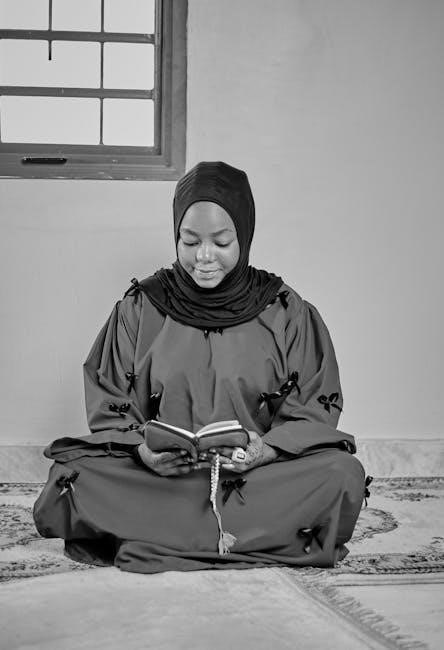
Managing Wealth According to Islam
Managing wealth in Islam involves adhering to divine guidelines to ensure ethical and responsible financial practices․ Muslims are entrusted with wealth as a test of gratitude and stewardship․ The Quran emphasizes moderation, avoiding excess, and using resources for the betterment of oneself, family, and society․ Wealth should be earned and spent in lawful ways, avoiding riba (interest) and unlawful transactions․ Islam encourages budgeting, saving, and investing in halal ventures while prioritizing spending on necessities and charitable causes․ Proper management fosters financial stability and aligns with Islamic values of fairness and justice․
Halal and Haram in Earnings and Spending
In Islam, earnings and spending must align with the principles of halal (permissible) and haram (forbidden)․ Halal income is earned through lawful means, such as honest trade, salaries for legitimate work, or investments in permissible businesses․ Haram income includes activities like usury, gambling, or exploiting others․ Spending must also be halal, avoiding wastefulness and ensuring resources are used for lawful purposes․ Muslims are encouraged to prioritize spending on necessities, followed by charity and savings․ The Quran emphasizes justice and fairness in financial dealings, urging believers to avoid doubtful transactions and seek halal avenues․ Proper adherence ensures a righteous and blessed life․
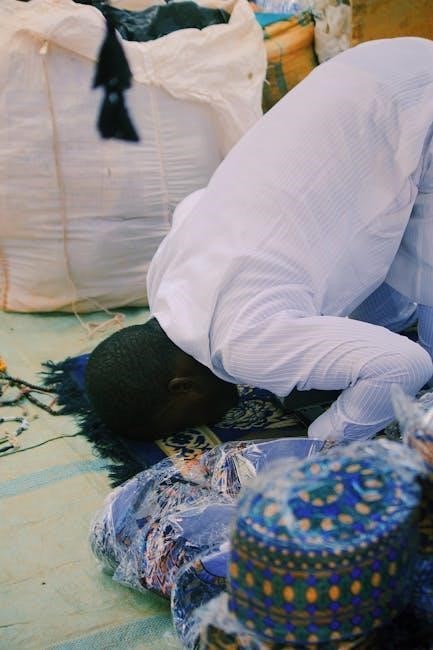
Challenges and Solutions
Muslims face challenges like cultural pressures, misunderstandings, and personal struggles․ Solutions include seeking knowledge, building strong faith, and engaging with supportive communities to navigate these obstacles effectively․
Overcoming Obstacles in Faith
Muslims often encounter obstacles in faith, such as doubt, temptation, and societal pressures․ To overcome these, it’s essential to strengthen one’s connection with Allah through consistent prayer, reflection, and seeking knowledge․ Surrounding oneself with supportive communities and mentors can also provide guidance and encouragement․ Additionally, practicing self-compassion and recognizing that setbacks are part of the spiritual journey can help maintain resilience․ By focusing on the ultimate goal of pleasing Allah and seeking His assistance, Muslims can navigate challenges with grace and determination․
Maintaining Identity in a Modern World
In today’s diverse and rapidly changing society, Muslims often face challenges in preserving their identity․ Balancing faith with modern life requires intentional efforts to stay rooted in Islamic values while engaging constructively with contemporary culture․ This involves adhering to Islamic principles in dress, behavior, and interactions, as well as actively participating in religious practices and community life․ Muslims can foster their identity by staying connected to their heritage, engaging in meaningful conversations about faith, and embracing opportunities to share Islam’s teachings with others․ By doing so, they can navigate modernity with confidence, ensuring their faith remains central to their lives․
Seeking Guidance from Scholars
Seeking guidance from knowledgeable Islamic scholars is essential for navigating the complexities of faith and practice․ Scholars, well-versed in the Quran, Sunnah, and Islamic jurisprudence, provide clarity on religious matters, helping Muslims apply teachings correctly․ Their expertise ensures that believers adhere to authentic traditions while addressing modern challenges․ Consulting scholars fosters a deeper understanding of Islam and helps resolve doubts or misconceptions․ It is a responsibility of scholars to remain informed and compassionate, offering guidance that aligns with Islamic principles․ By seeking their advice, Muslims can strengthen their faith and practice, ensuring they follow a path rooted in knowledge and wisdom․
Living Islam fully means embracing it as a way of life, continuously learning, and striving for Jannah with faith, worship, and righteous deeds․
Living Islam as a Comprehensive Way of Life
Embracing Islam as a complete way of life involves integrating faith into every aspect of daily life, from personal habits to social interactions․ It is not just about rituals but a holistic approach to living guided by divine teachings․ Islam teaches balance, moderation, and purpose, ensuring that believers cultivate a strong connection with Allah while fulfilling their duties in the world․ By adhering to the Five Pillars, following the Quran and Sunnah, and embracing Islamic values, Muslims can live a life that reflects their faith․ This comprehensive lifestyle fosters spiritual growth, moral integrity, and a sense of community, ultimately leading to a fulfilling and purpose-driven existence․ Islam is not just a religion; it is a way to live meaningfully and responsibly in harmony with Allah’s will․
Striving for Jannah: The Ultimate Goal
Continuous Learning and Growth
Continuous learning and growth are essential in Islam, as they foster spiritual and personal development․ Muslims are encouraged to seek knowledge throughout their lives, as the Prophet Muhammad (peace be upon him) emphasized, “Seek knowledge from the cradle to the grave․” This pursuit includes understanding the Quran, Sunnah, and Islamic teachings, as well as gaining wisdom in worldly matters․ Learning strengthens faith, enhances character, and equips believers to navigate life’s challenges․ By engaging in regular study, reflection, and self-improvement, Muslims can deepen their connection with Allah and fulfill their potential․ This lifelong journey of growth ensures that faith remains dynamic and relevant in every stage of life, fostering a balanced and purposeful existence․ Knowledge is a gift, and its pursuit is a divine command․
